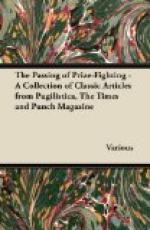Title: Punch, Or The London Charivari, Vol. 99., December 27, 1890
Author: Various
Release Date: July 19, 2004 [EBook #12944]
Language: English
Character set encoding: ASCII
*** Start of this project gutenberg EBOOK punch ***
Produced by Malcolm Farmer, William Flis, and the
Online Distributed
Proofreading Team.
PUNCH,
Or the London charivari.
Vol. 99.
December 27, 1890.
[Illustration: ‘Dressed-Crab’]
* * * * *
Our booking-office.
The origin of the phrase, Le Coup de Jarnac, is interesting, and the story is well told by Mr. MACDOWALL in Mac_millan’s Magazine_. Good, this, for “The Two Macs.”
[Illustration]
In The Argosy, edited by Mr. Charles Wood, there are two good most seasonable Ghost Stories, by Charles W. Wood, the “Rev. F.O.W.” The first is not new, as there is a similar legend attached to several old Manor Houses, one of a Sussex Family House, the Baron had first-hand, from a witness on the premises. It lacked corroboration at the time, and is likely to do so.
The Letters passing between a fine young English Cantab, “all of the modern style,” and his family at home, are uncommonly amusing. Harry Fludyer at Cambridge is the title of the book, published by CHATTO and Windus. Well, to quote the ancient witticism in vogue tempore EDOUARDI RECTI et DON PAOLO BEDFORDI (the great Adelphoi, or rather the great “Fill-Adelphians,” as they were once called), “Things is werry much as they used to was” at Cambridge, and University life of to-day differs very little from that of yesterday, or the day before, or the day before that. “Haec olim meminisse juvabit,” when, half a century hence, the rollicking author of these letters—which, by the way, first appeared in The Granta—is telling his Minimus what “a dog,” he, the writer, was, and what “a day he used to have,” in the merry time that’s past and gone. “His health and book!” quoth the Baron.
A more muddle-headed story than The Missing Member I have not read for some considerable time.
The Baron sends Hachette & CIE.’S “Mon Premier Alphabet,” and the moral tale of “Mlle. Marie Sans-souci,” up to the nursery where they will be much appreciated by the little Barons.
“LETT’s get a Diary,” quoth a Barren Jester, not the Baron DE B.W., who, had it not been Christmas time, would have expelled the witty youth. “No joke, if you please,” quoth he, “about LETTS’s Diaries. We may advertise these useful and hardy annuals in canine Latin and say, ‘Libera nos!’ i.e., Letts out!”




